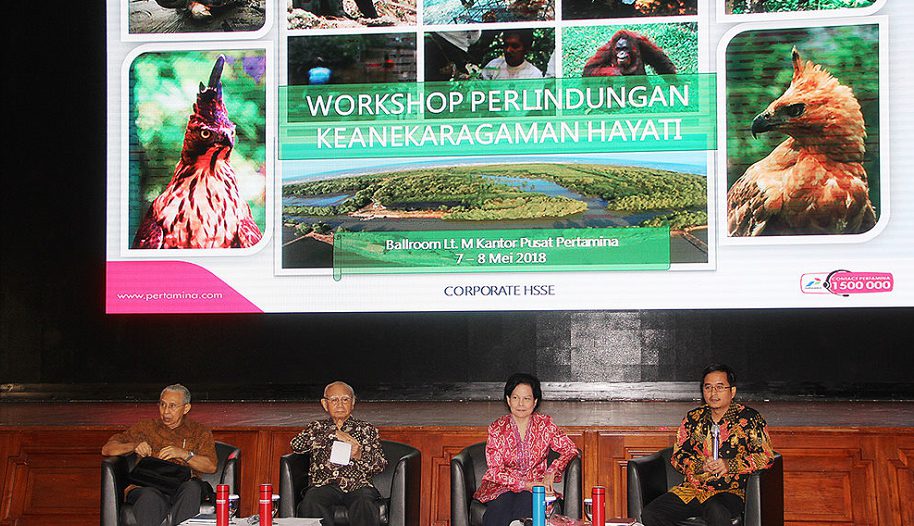Every party shares the duty to preserve biodiversity.

-
Date:
30 Apr 2020 -
Author:
KEHATI
All stakeholders bear the responsibility of enhancing and safeguarding biodiversity. Consequently, it is crucial to foster public comprehension and awareness, which also encompasses the private sector, in regards to the significance of preserving natural resources and protecting biodiversity (KEHATI).
The Indonesian Biodiversity Foundation (KEHATI) along with PT Pertamina acknowledged this need and arranged a two-day workshop on the protection of biodiversity. This event took place at the Central Pertamina Building, Jakarta, from 7-8 May 2017.
The workshop was graced by the presence of numerous resources personnel and environmental experts. This included eminent environmental personalities and KEHATI advisers such as Emil Salim, Ismid Hadad, and Erna Witoelar. Additionally, representatives from the Indonesian Institute of Sciences (LIPI) and Ministry of Environment and Forestry also partook as speakers. During this event, the KEHATI Foundation and Pertamina held discussions on the biodiversity conservation measures that have been implemented across various regions within the nation..
At the workshop, Lelin Eprianto, Senior Vice President Corporate of PT Pertamina HSSE made a speech. His audience comprised approximately 200 personnel from the Corporate Social Responsibility (CSR) and PT Pertamina’s Health, Safety & Environment (HSE) Division. Eprianto emphasized that the purpose of this activity was to gather inspiration and suggestions for enhancing biodiversity conservation and protection programs at Pertamina project sites.
Eprianto stated that environmental sustainability serves as the primary gauge across all Pertamina work sectors. He highlighted his vision for Pertamina to evolve into an energy company that transcends culture, safety, and environmental constraints.
Eprianto concluded by underscoring that “Pertamina is obligated to preserve the environment.”.
In its quest for institutional excellence, PT Pertamina is devoted to four primary factors: avoiding environmental pollution, eliminating community complaints, adhering to environmental laws and regulations, and employing an efficient environmental management system or natural resource program. This commitment is demonstrated through the appropriate awards that Pertamina has acquired.
“Moving forward, our goal is for all Pertamina operational areas to achieve these awards, particularly in the gold and green classifications,” said an official.
Meanwhile, on the same event, Riki Frindos, Executive Director of the KEHATI Foundation stressed the importance of managing and utilizing the Earth and its biodiversity in a wise and sustainable manner.
Riki reminded, “We do not own the biological natural resources supplied by the Earth. We merely utilize these resources to sustain our lives, which we then have the responsibility to pass onto future generations.”.
Nonetheless, the task of preserving biodiversity can’t be fulfilled without the collective efforts of all sectors of society, notably the business community. This is a joint responsibility that everyone should share. Riki expressed his gratitude towards Pertamina for their dedication to biodiversity preservation, including the organization of this workshop.
Riki said, “We are hopeful that this workshop will act as a foundation for further collaboration between PT Pertamina and KEHATI.”
On a similar note, Emil Salim emphasized on long-term development through smart practices. Emil pointed out that Pertamina is a commendable corporation in oil production. Ideally, the corporation should aim to be an oil producer that doesn’t harm the environment.
Emil, the first Minister of the Environment of the Republic of Indonesia, stressed, “Extracting oil shouldn’t be at the cost of causing damage to the environment and our future. Damaging biodiversity now equates to damaging our future.”.
Risks Associated with Biodiversity Disruption
Emil proceeded to detail, “Biodiversity encompasses every living creature on our planet. This includes an extensive variety of plants, animals, and microbes. We categorise them into three distinct diversities: the diversity within ecosystems, species, and genetics, also known as genetic resources”.
Biodiversity sustains several environmental services pivotal to humanity. It offers myriad benefits including food, medicinal sources, clothing, energy, and the assurance of clean air and water. Moreover, it safeguards us from the chaotic wrath of natural disasters and regulates the earth’s climate.
“Consequently, any jeopardy to biodiversity culminates in far-reaching effects. The repercussions will not be restricted to mankind alone. It jeopardizes the environmental resilience — the foundation for every living entity on this earth,” Emil concluded.
The potential danger and increased pace of extinction at biodiversity, genetic, species, and ecosystem levels are affected by numerous reasons, which may be either natural or man-made. Currently, human activity is the predominant factor, mainly via land transformation, population growth, deforestation, overuse of natural resources, introduction of foreign and invasive species, as well as global warming and climate change.
In addition, according to Emil, efforts towards biodiversity preservation have consistently been a topic of international discussions. This is particularly in response to the repercussions of economic development that solely focus on growth rates, overlooking social and environmental aspects.
The World Commission on Environment and Development introduced the idea of sustainable development in 1987, which was later endorsed at the 1992 Earth Summit. According to the commission’s definition, sustainable development should fulfill current needs without compromising the ability of future generations to meet their needs.
Indonesia was one of the nations that ratified the Convention on Biodiversity (CBD) in 1992. This ratification positioned Indonesia in agreement to protect and use biodiversity sustainably, which was included in the Aichi Biodiversity Targets.
Emil suggested that as one of the world’s foremost megabiodiversity nations, Indonesia must ensure its development activities align with initiatives to protect the environment and conserve biological resource diversity. This should be done while referring to global regulations.
He emphasized that the principle of sustainable development eventually evolved into Sustainable Development Goals (SDGs). These consists of 17 aims and 169 sustainable development objectives applicable to all UN member nations.
